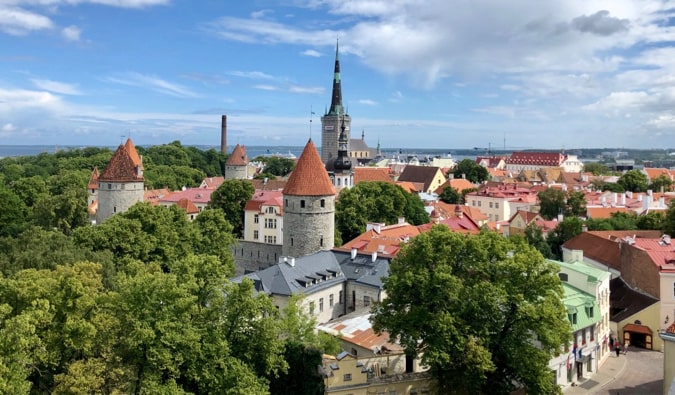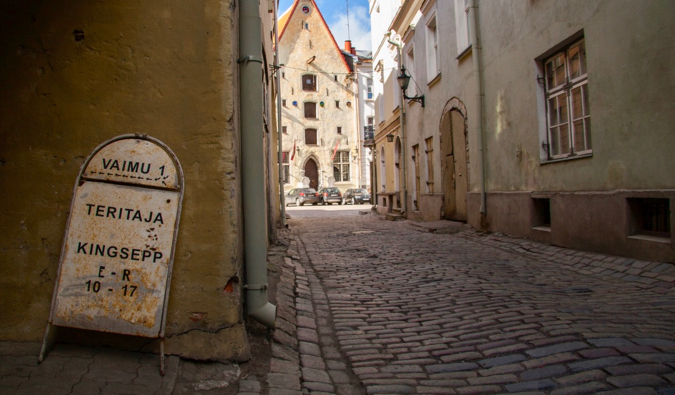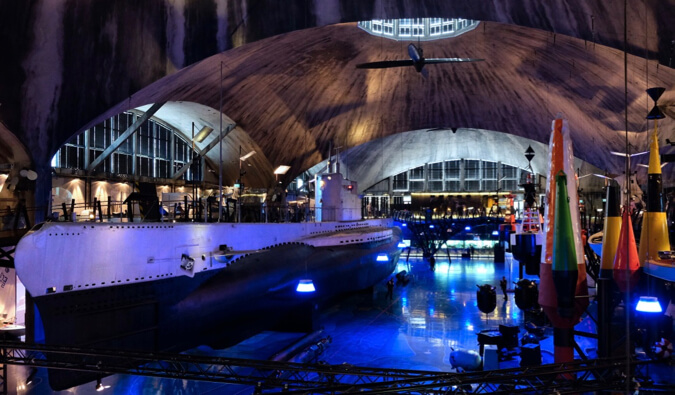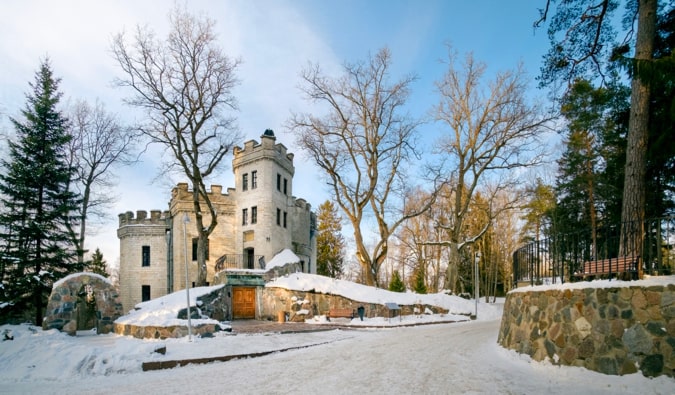
Posted: 03/12/20 | March 12th, 2020
Tallinn, the capital of Estonia, is a medieval city nestled against the Baltic Sea. With its picturesque historic Old Town that dates back to the 13th century, it has been drawing in tourists since the fall of the Soviet Union.
Cheap flights, cheap prices, and the beauty of Prague without the crowds have made Tallinn an appealing weekend getaway for Europeans.
I visited the city on a trip from Finland — there’s a frequent ferry service between the two cities — and was enamored by it. It was a blend of Nordic and Baltic culture with plenty of things to see and do.
Best of all, it was super affordable!
Though the city has become a bit more crowded and expensive in the last couple of years, it’s still one of my favorite places in the region. It’s peaceful and wonderful: the people are open and relaxed and the country is super tech-forward (they offer e-residency services specifically for digital nomads).
To help you make the most out of your trip, here are the best things to see and do in Tallinn — from the super touristy to off the beaten trail!
1. Take a Free Walking Tour

One of the best things you can do when you arrive in a new city is to take a free walking tour. They’re a great way to learn about a destination and its history while taking in the main sights.
Not only will it give you a solid introduction to the city but you’ll get access to a local guide who can answer any and all questions you might have.
EstAdventures has a few different free tour options, including general walking tours, tours focused on the city’s communist past, and street art tours. Just make sure to tip your guide!
2. Estonian Maritime Museum

Founded in 1935 and located inside a historic 500-year-old building, this museum highlights the history of Estonia’s maritime culture. The main attraction is the interactive Seaplane Harbour exhibition, which includes a Short 184 seaplane as well as the steam-powered icebreaker Suur Toll.
And don’t miss the 1936 submarine Lembit, the only surviving Baltic warship from before WWII (and one of only two submarines in Estonian naval history). There’s also an aquarium, ship miniatures, and a flight simulator. It’s a fun and educational place for adults and kids alike.
Vesilennuki tee 6, +372 6200 550, meremuuseum.ee. Open Tuesday–Sunday 10am–6pm; closed Monday. Admission: 15 EUR.
3. Glehn Park & Castle

Glehn Park, located on the Nomme hillside, is home to medieval-style Glehn Castle. Built in 1886, both the park and castle were created by Nikolai von Glehn, a rich and eclectic man known for his unusual taste in decoration (such as tables and chairs carved like figurines, large statues, and an obelisk in front of his house marking the grave of his favorite horse).
Unfortunately, most of the castle was looted during World War I, so none of the unique pieces of furniture he created remain. However, you’ll still get to see the statues he built on the grounds of the park. There’s also an observatory tower and palm house, which has a gorgeous mosaic rooftop. It’s a good place to relax, go for a walk, or go skiing during wintertime.
Vana-Mustamäe 48, +372 652 5076, ttu.ee/organisatsioonid/glehni-loss. The building isn’t open to the public as it is now used for events (weddings, conferences, receptions, etc.).
4. Tallinn Town Hall & Square

Tallinn’s Gothic town hall is the oldest in the Baltics. Completed in 1404, it boasts a 64m spire topped with a weather vane of an old warrior (named Old Thomas), a Tallinn city guard and hero from the 16th century who fought in the Livonian War.
You can climb the spire to 34 meters (111 feet) from May through September. The interior of the Town Hall is open to visitors as a museum only during July and August; inside, you’ll get to see colorful designs on the walls, intricate wood carvings, and stunning arched ceilings as you learn about the city and its history.
The surrounding plaza is a great place to people-watch and it hosts lots of activities and markets throughout the year.
Don’t miss the annual five-day Tallinn Old Town Days festival held in May. It’s dedicated to the cultural heritage of Tallinn and includes themed days such as Medieval Day and Children’s Day, as well as numerous workshops, music, and theatre performances.
Raekoja plats, Kesklinna linnaosa (City Center), +372 645 7906, raekoda.tallinn.ee/. Open weekdays from 10am-4pm. Advance reservations required. Admission is 5 EUR.
5. Tallinn Museum of Photography

Hidden amidst the cobblestone streets of Tallinn, this small museum is tucked away inside a 14th-century prison. It focuses on Estonia’s history of photography with a permanent exhibition including antique photos and cameras from 1840 — when photography first made its way to Tallinn — to 1940.
You can also check out contemporary photography from modern-day artists in many of the museum’s rotating exhibits. It’s a very small museum, but super interesting even if you’re not a huge photography buff.
Raekoja 4/6, +372 644 8767, linnamuuseum.ee/fotomuuseum. Open Saturday, Wednesday, and Friday from 10am–5pm, Thursdays from 12–8pm, and Sunday from 11am–4pm. Closed Monday and Tuesday.
6. Estonian Open-Air Museum

Located 15 minutes from the city center by car, this open-air ethnographic museum recreates what life was like in Estonia’s rural countryside. It’s a life-sized rural village composed of farms, a wooden chapel, a school, fire station, shop, and an inn that highlights how families from different social classes lived during the 18th and 19th centuries.
There’s plenty to do, from eating a traditional Estonian meal to riding a horse to taking a workshop. It’s open all year round, but you might want to go during the summertime when it’s warm! It’s also one of the best things to do in Tallinn with kids. Download the mobile app Numu for a free audio guide while you’re at the museum.
Vabaõhumuuseumi tee 12, +372 654 9100, evm.ee/est/avaleht.Open daily from 10am–5pm. Admission is 8 EUR. Free entrance with a Tallinn Card.
7. Ichthus Art Gallery

This is one of Tallinn’s best-kept secrets. It’s tucked away in the depths of St. Catherine’s Dominican Monastery, which dates back to 1246. On arrival, turn right toward steep steps that take you into the cellar. The confined space used to contain three wings, called the Claustrum, that housed monks in the 13th century.
Today, the space is used by artist Aleksandr Savchenkov, who sells his original artwork from the cellar. As you wander about you’ll also see the ‘Energy Pillar’, which is located in the ancient monastic chambers and is said to be a source of spiritual well-being.
Müürivahe Tänav 33, +372 5559 5920. Admission is free; however, donations are accepted.
8. Epitaphs of the Cathedral of Saint Mary

The grounds of this church date back to the 13th century, though the current building itself is from the 17th. What makes it unlike most other churches is that coats-of-arms epitaphs hang on the walls of the church instead of more traditional religious artwork or decorations.
Historically, these were used as headstones for people of importance, such as nobles and knights. They reflect the people of status who were buried on the grounds.
In fact, the first man who ever led a Russian voyage around the world, Admiral Adam Johan von Krusenstern, is buried here. Climb the 69-meter (226-foot) bell tower to get a beautiful view of the city.
Toom-Koolitänav 6, +372 644 4140. Open Tuesday–Sunday 10am–3:30pm, closed Mondays. Admission is 5 EUR for adults and 3 EUR for children. Dress respectfully as this is a place of worship.
9. Estonian Architecture Museum

The Estonian Architecture Museum was established in 1991 during the fight for Estonian independence. The museum is located in the Rotermann Salt Storage building, which was built in 1908 (and then reconstructed in 1995 with multiple additional floors for the museum).
Its galleries now feature drawings from the 1920s, as well as over 11,500 archived items (such as drawings and sketches) and some 18,000 items in their photo collection. There are always some interesting rotating exhibits here too.
Ahtri tänav 2, +372 625 7000, arhitektuurimuuseum.ee. Open Tuesday–Sunday 11am–6pm, closed Mondays. Admission is 6 EUR.
10. TV Tower

Adrenaline junkies will get a kick out of visiting the TV Tower. Not only will you have an incredible bird’s-eye view of Tallinn from the top, which stands 314 meters (1,030 feet) tall, but you can also try the Walk on the Edge experience. Hop into a harness and step outside of the tower onto the exposed deck. It’s the highest open deck in Northern Europe and offers both an amazing view and a huge rush!
The TV Tower was constructed when Tallinn was chosen as a host city for sailing during the 1980 Moscow Olympics. It closed in 2007 for renovations and reopened in 2012. It has floor-to-ceiling windows (not ideal if you’re afraid of heights) so you can really soak in the view as well as touch-screen information panels so you can learn about the tower and the city.
The tower hosts many events, such as music concerts and the annual Stair Run to mark the anniversary of its reopening.
Kloostrimetsa tee 58 A, +372 686 3005, teletorn.ee. Admission is 13 EUR and the Walk on the Edge costs 30 EUR.
11. Telliskivi Creative City

The Telliskivi Creative City is a workplace for over a thousand people, with artist’s studios, a radio station, rehearsal spaces, and NGO offices, all situated throughout ten repurposed factory buildings. Telleskivi hosts a flea market every Saturday, and there are over 600 cultural events throughout the year, including dance performances, music concerts, and improv theatre.
There are colorful murals on many of the buildings and you’ll also find restaurants and bars full of locals and tourists alike. Make sure you eat at Peatus (“Stop” in Estonian) for a really unique experience: it’s located inside two old Soviet railcars (and the food is great too!).
Telliskivi tänav 60a, Pohja, Tallinna linnaosa.
12. Bastion Tunnels

These tunnels were initially built in the 17th century as an addition to the Kiek in de Kök (Peek in the Kitchen) tower, and were intended for storage. They later held prisoners and then were used as shelters against air raids during World War II.
In more modern history, thieves and rebels used them for shelter since the police usually avoided the tunnels. They were cleaned out and opened up to the public in 2004. If you’re brave enough, you can explore the winding maze of the dark, damp tunnels on a guided tour when you visit the tower.
Komandandi tee 2, +372 644 6686, linnamuuseum.ee/kiek-de-kok. Open Tuesday–Sunday 10am–5pm (Thursday until 8pm), closed Monday. Admission is 14 EUR.
13. Toompea Castle & Alexander Nevsky Cathedral

Toompea Castle dates all the way back to the 9th century and is currently used by Riigikogu, Estonia’s Parliament. The east wing has a brightly colored pink and white exterior in baroque style, as ordered by Empress Catherine the Great in 1773. The opposing side still has its medieval stone exterior. The Estonian flag is raised above the tower at sunrise every day.
You can also visit the nearby Alexander Nevsky Cathedral. It opened in 1900 during the Czarist Empire and is home to Tallinn’s largest bell (it weighs 15 tons). The impressive exterior showcases Russian Revival architecture with its onion-shaped dome. The interior is decorated with colorful mosaics and stained-glass windows and has three ornate altars.
Toompea Castle: Lossi plats 1a, +372 631 633, riigikogu.ee. On Thursdays at 11am, there’s a 45-minute English-language tour of the castle. Admissions is free though you need to reserve your spot in advance.
Alexander Nevsky Cathedral: Lossi plats 10, +372 644 3484, cathedral.bg/en/home. Open daily from 7am-7pm. Admission is free. Dress respectfully as it is a place of worship.
14. Soviet Statue Graveyard

The Soviet Statue Graveyard, located near Maarjamäe Castle, contains a collection of discarded statues, such as those of Joseph Stalin, Vladimir Lenin, and Mikhail Kalinin. After the Soviets left Tallinn, they were dumped here and ignored.
You’ll find large statues of heads (a classic Soviet statue trend) and others that tower over three meters (ten feet) tall. It’s a surreal place to visit — especially when you realize it hasn’t even been 30 years since Estonia achieved independence and these statues were left to fade into history.
Pirita tee 56, 10127, ajaloomuuseum.ee/exhibitions/permanent-exhibitions/noukogude-aegsete-monumentide-valinaitus. Open Tuesday–Sunday 10am–6pm, closed Monday.
15. KGB Museum

Rooms previously used by spies during the Soviet era sit on the top floor of the stylish Hotel Viru, located on Viru Square. They house listening and recording equipment (some cleverly disguised), dial telephones, uniforms, and a typewriter.
Few people ever knew these rooms existed, and they were only exposed in the 1990s when the KGB fled the city. They shed light on just how controlling and subversive the Soviet government was during the occupation.
Viru väljak 4, +372 680 9300, viru.ee/en. Open daily from 10am–5pm. The guided tour begins in the hotel lobby.
16. Take in the View

For the best view in the city, head to Kohtuotsa viewing platform. It’s on Toompea Hill and offers the best view of the city and harbor. You’ll also often find buskers here, making it a nice place to end your day and watch the sunset.
***
Tallinn remains one of my favorite destinations in Europe. It’s a fun and lively city home to quirky museums, hidden art exhibits, and beautiful architecture.
Go enjoy all the wonderful things to do here.
Book Your Trip to Estonia: Logistical Tips and Tricks
Book Your Flight
Find a cheap flight by using Skyscanner or Momondo. They are my two favorite search engines because they search websites and airlines around the globe so you always know no stone is left unturned.
Book Your Accommodation
You can book your hostel with Hostelworld. If you want to stay elsewhere, use Booking.com as they consistently return the cheapest rates for guesthouses and cheap hotels. My favorite hostel in the city is:
- Tallinn Backpackers – This is a lively, social hostel that makes it easy to meet people since they have a pub crawl every night. The staff are great too!
Don’t Forget Travel Insurance
Travel insurance will protect you against illness, injury, theft, and cancellations. It’s comprehensive protection in case anything goes wrong. I never go on a trip without it as I’ve had to use it many times in the past. I’ve been using World Nomads for ten years. My favorite companies that offer the best service and value are:
- World Nomads (for everyone below 70)
- Insure My Trip (for those over 70)
Looking for the best companies to save money with?
Check out my resource page for the best companies to use when you travel! I list all the ones I use to save money when I travel – and I think will help you too!
Photo credit: 3 – Vladimir Varfolomeev, 4 – Holger Vaga, 5 – Pudelek, 6, 7 – Sander Säde, 8, 9 – Zairon, 10 – Nosser, 11 – Sheila Dee, 12 – Relkmsaiia, 13 – Narva69, 14 -Diego Delso, 15 – Ferran Cornella, 16, 17 – PIERRE ANDRE LECLERCQ
The post 16 Things to See and Do in Tallinn, Estonia appeared first on Nomadic Matt's Travel Site.
Filed under: Riding Tips
Like this post? Subscribe to my RSS feed and get loads more!